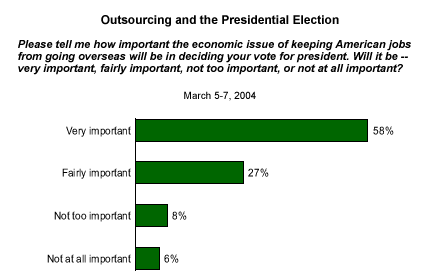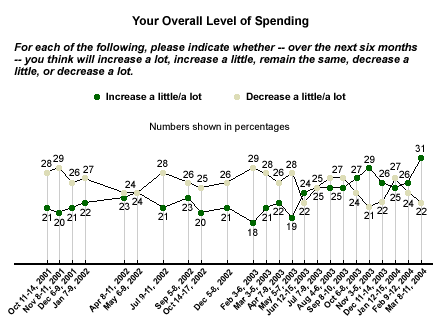Several years ago, Federal Reserve Board Chairman Alan Greenspan raised many eyebrows on Wall Street by coining the phrase "irrational exuberance," in reference to the developing equity market bubble. Although many still haven't forgiven him for his monetary policies as the bubble burst, Greenspan turned out to be extremely perceptive.
During recent months, Greenspan's new catch phrase appears to have become "palpable unease." In his speech Friday at the Boston College Finance Conference, Greenspan noted, "There is a palpable unease that businesses and jobs are being drained from the United States, with potentially adverse long-run implications for employment and the standard of living of the average American. Job insecurity is understandably significant when nearly two million members of our workforce have been unemployed for more than six months."
The results of a new CNN/USA Today/Gallup poll, conducted March 5-7, suggest that Greenspan may once again be showing his prescience. Public opinion implies that in the months ahead, we are likely to hear a great deal more about the "palpable unease" among Americans when it comes to jobs, particularly as the presidential election gets closer. But will this growing unease slow down consumer spending and the U.S. economy during the last half of the year?
There Is a Palpable Fear of Outsourcing
Six in 10 Americans (61%) currently say they are concerned that they, a friend, or a relative might lose a job because the employer is moving that job to a foreign country. Forty-one percent say they are "very concerned" about this happening, and another one in five (20%) say they are "somewhat concerned."

Six in 10 Americans (58%) say that this issue -- sending U.S. jobs to foreign countries -- will be "very important" when they are deciding their votes for president, and another one in four (27%) say it will be "fairly important."

Consumers Plan to Increase Spending
Traditional economic theory suggests that job market fears translate into reduced consumer spending as people build their savings in case of emergency. However, a March 8-11 Gallup Poll* shows that 31% of consumers plan to increase their spending over the next six months. This percentage is higher than it has been at any time since Gallup began asking the question in October 2001.

Bottom Line
Greenspan points out that the fear of outsourcing used to be associated predominantly with the loss of manufacturing jobs. But now that fear has expanded to include better-paying, white-collar jobs. So if the fear of outsourcing has become so widespread, why do so many consumers plan to increase their spending?
For most Americans, outsourcing is not only something to fear, but it is also something that is incredibly difficult to anticipate. An employee's company may be growing and making money. The individual employee may be experienced, very productive, and highly valued in his or her workplace. But regardless, global economic considerations can end up eliminating the employee's job and sending it overseas.
As a result, the job insecurity associated with outsourcing is much different than the insecurity produced by an economic downturn. Consumers might cut back on spending and build their savings in anticipation of temporary layoffs or job losses when the economy slows. But how can they deal with the lightning bolt-like impact of outsourcing as it destroys the value of their human capital? In my view, most consumers simply don't know how to prepare for such a possibility, so they aren't trying to do so.
In the short term, this means consumers will continue to spend, encouraged by their tax refunds even as overall consumer confidence erodes. This spending will be good for economic growth and the equity markets. However, the fear of job outsourcing is likely to be just the opposite for political incumbents in this year's elections.
*Results are based on telephone interviews with 1,005 national adults, aged 18 and older, conducted March 5-7, 2004, and telephone interviews with 1,005 national adults, aged 18 and older, conducted March 8-11, 2004. For results based on the total sample of national adults, one can say with 95% confidence that the margin of sampling error is ±3 percentage points.

